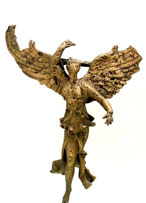| Author | |
|---|---|
| Epoch | XIII C. |
| Work | Life and work of saint Nino, equal to apostles (Monuments of Old Georgian Hagiographic Literature, Book III, (Meta-phrasal Editorships), directed and edited by Ilia Abuladze, Tbilisi, 1971) |
| Type | |
| Quote | “It has to be recounted what the provenance of Kartlian kings was, as when King Alexander conquered everybody he entered Kartli and encountered a kin of cruel pagans […] and when Alexander became powerful everywhere he again came to Kartli and razed the cruel pagans’ castles and towns to the ground […] and granted the country of Kartli to Azon […] and Alexander himself left. Then Azon went to Arian Kartli to his father and brought with him a thousand families of peasants and again ten families of their chiefs and with them there were their mothers and children and they settled in Kartli and worshipped their pagan gods that they brought with them. And this Azon was the first king of Georgians” (pg. 80) |
| Term |
|

| Comment | G. Kavtaradze: “Concerning the issue [of Azon E.K.] “The Lives of the Kings” shows a clear irrelevance with the abovementioned information contained in the “Conversion of Kartli”. For the “The Lives of the Kings” the son of Arian Kartli’s king is Azomacedonianiazon” (g. Kavtaradze, Works of the Institute of History and Ethnology, IX, Iv. Javakhishvili Institute of History and Ethnology, Tbilisi, 2009, pg. 41) G. Melikishvili: In the opinion of G. Melikishvili, Arian of “Arian Kartli” can be the result of distortion of Pyrenees (G. Melikishvili, On the Ancient Issue of Georgia, Caucasus and the Near East, Tbilisi, 1965, pg. 16) G. Kavtaradze: “It is well known, that Alexander himself never invaded Caucasus, although the Georgian and Armenian chronicles’ notes, justly considered legendary, about Alexander the Great’s involvement in the matters of Caucasus and its adjacent territories and, in all probability, the local governors’ really existing wishes to link their own goals to Macedonians’ interests and use their power for the realization of these goals, are allegedly reflected in the Roman writer’s and politician’s of the II century A.D., Flavius Arianne’s work “Alexander’s Campaign” [According to Flavius Arianne’s note, in 329/328 B.C. Pharsmanes, the king of “Khwarezm”, visited Alexander and offered him alliance in fighting against Colchis and Amazons. Alexander promised him that after conquering Asia and returning via Hellespont and Proponditis he would by all means invade Ponto (Arrianus, 67, XV, IV)E.K.] (G. Kavtaradze, Probleme der historischen Geographie Anatoliens und Transkaukasiens im ersten Jahrtausend v. Chr. (Caucasica) – Orbis Terrarum, Internationale Zeitschrift für historische Geographie der Alten Welt, 2, 1996, Stuttgart, 1996, 191-216). |
|---|

